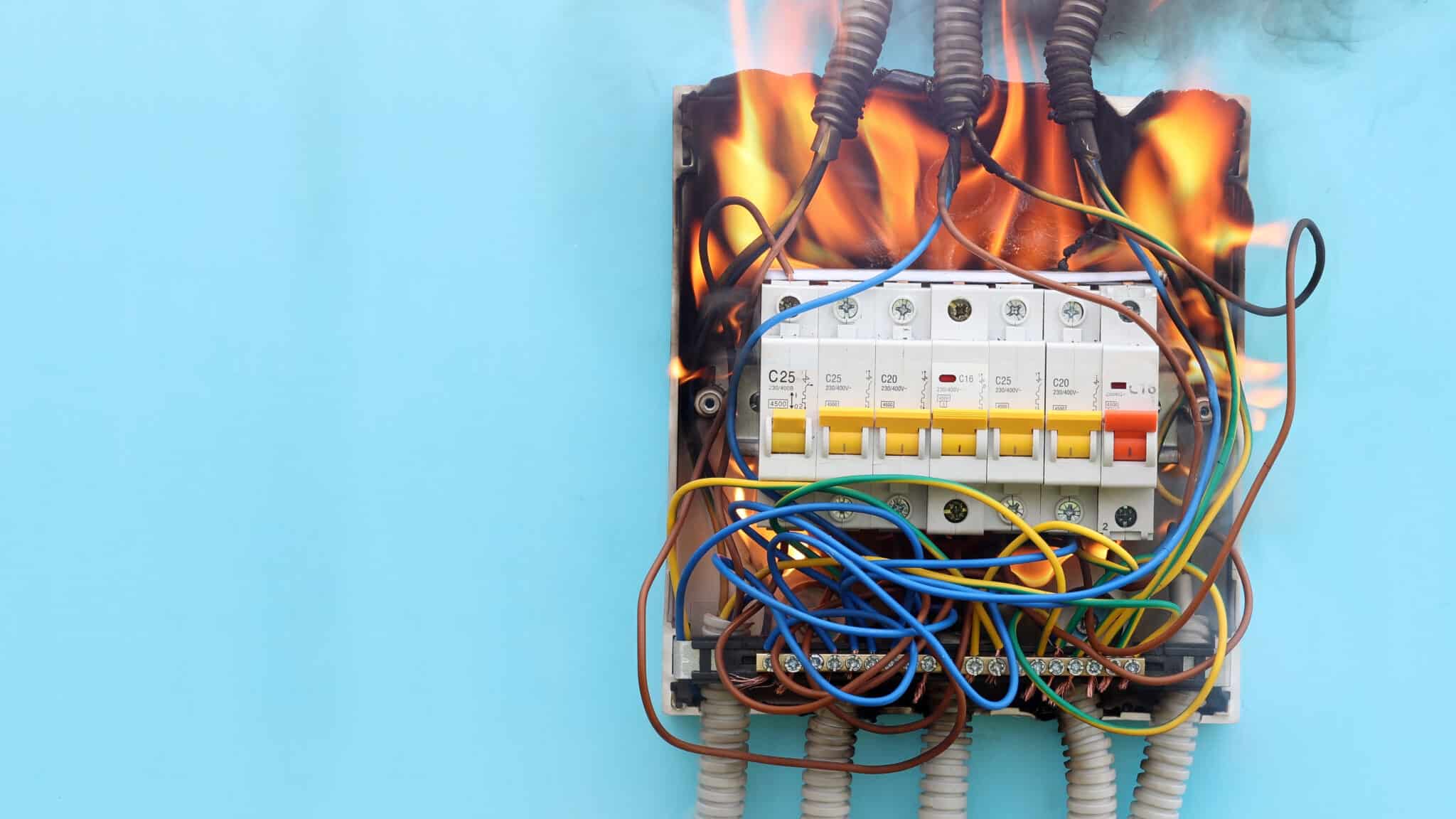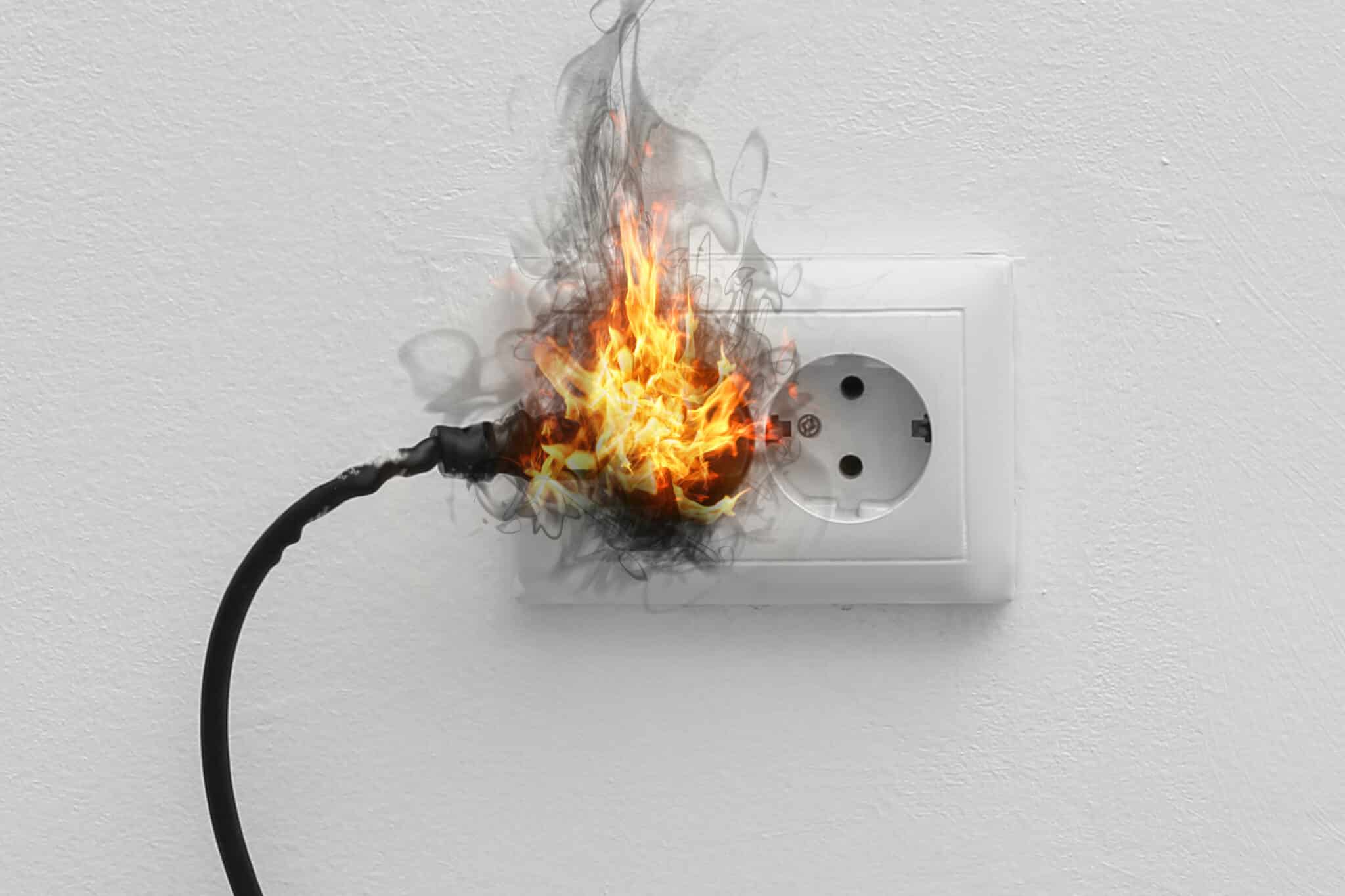
Electrical fires are a serious concern for every homeowner. They can happen without warning and cause significant damage to your property, not to mention the potential risk to your family’s safety.
But the good news is that with the right precautions, you can significantly reduce the risk of electrical fires in your home. In this guide, we’ll walk you through some practical tips to prevent electrical fires and keep your home safe.

What Are Electrical Fires?
Electrical fires are fires that start due to electrical faults. These faults can occur in wiring, appliances, outlets, or electrical panels.
When these components malfunction, they can produce sparks or excessive heat, leading to a fire.
These fires are often hard to detect until they have already caused significant damage, making prevention even more critical.
These types of fires can be particularly dangerous because they may start in hidden areas, such as behind walls or within appliances, making them difficult to notice until they have spread.
Additionally, they can reignite even after they appear to be extinguished if the underlying electrical issue is not resolved. This makes understanding and preventing these fires crucial for home safety.

Understanding the Causes of Electrical Fires
Before diving into prevention tips, it’s essential to understand what causes electrical fires. Here are some common culprits:
Faulty Wiring
Old or damaged wiring can cause sparks and fires. Over time, wiring can degrade due to age, rodent damage, or environmental factors like moisture.
Homes with outdated electrical systems are particularly at risk, as they may not be equipped to handle modern electrical loads.
Overloaded Circuits
Plugging too many devices into a single outlet can overload the circuit, leading to overheating.
This is especially common in older homes where the electrical system was not designed to support the number of devices we use today. Overloading can cause wires to heat up, melt their insulation, and ignite nearby materials.
Faulty Appliances
Appliances with damaged cords or internal faults can ignite. This can happen if an appliance has been mishandled, exposed to moisture, or simply worn out over time. Faulty appliances can draw excessive current, leading to overheating and fires.
Improper Use of Extension Cords
Using extension cords for prolonged periods or exceeding their capacity can cause them to overheat.
Extension cords are meant for temporary use and can become dangerous when used as a permanent solution.
Overloaded extension cords can melt or catch fire, especially if they are not rated for the connected devices’ power requirements.
Short Circuits
When a live wire touches a neutral wire, it can cause a short circuit, which generates a lot of heat.
Short circuits can occur due to damaged insulation, loose connections, or faulty wiring. The sudden surge of electrical current in a short circuit can cause sparks and ignite nearby combustible materials.
Now that we know what can cause electrical fires, let’s look at how to prevent them.
Tips to Prevent Electrical Fires at Home
Perform Regular Electrical Maintenance
Regular electrical maintenance is crucial to ensuring the safety and functionality of your home’s electrical system. By staying proactive, you can prevent potential hazards and extend the life of your electrical components.
Routine Inspections: Routine inspections help identify problems before they escalate into major issues, ensuring minor faults are fixed promptly. Regularly checking your electrical system ensures that everything is in good working order and complies with current safety standards.
Hire Qualified Electricians: Always hire qualified electricians for any electrical work to ensure all tasks are performed safely and up to code. Certified professionals have the expertise and tools to perform thorough inspections, repairs, and upgrades safely and effectively.
Replace Damaged or Outdated Wiring: Old or damaged wiring is a common cause of electrical fires and should be replaced to prevent potential hazards. If your home has outdated wiring, consider having it replaced. Modern wiring systems are designed to handle today’s electrical loads more safely and efficiently.
Avoid Overloading Circuits
Overloading circuits is a frequent cause of electrical fires and can be prevented by distributing electrical devices properly.
Proper management and distribution of electrical devices can help prevent this issue.
Distribute your electrical devices evenly across different circuits to avoid overloading any single one. Avoid plugging too many high-wattage appliances into a single outlet.
Ensure that your circuit breakers and fuses are the correct type and rating for your electrical system.
Regularly check and replace any that are faulty or have been frequently tripping to maintain a safe electrical environment.
Extension cords are designed for temporary use and should not be overloaded with multiple devices.
Overloading them can cause overheating and fire. Use them sparingly and ensure they are not overloaded with too many devices.
Use Appliances Safely
Safe usage of appliances is critical to preventing electrical fires, ensuring they are always in good condition. Follow guidelines and regularly inspect appliances for any signs of damage.
Inspect Appliances for Damage: Regularly check your appliances for frayed cords, exposed wires, and other damage to ensure they are safe to use. Replace or repair damaged appliances promptly to avoid hazards.
Safe Usage Guidelines: Always follow the manufacturer’s instructions for appliance use to ensure proper and safe operation. Ensure that appliances are used in well-ventilated areas and kept away from water sources.
Malfunctioning electronics can overheat and ignite, posing a significant fire risk. Unplug malfunctioning devices immediately and have them repaired or replaced by a professional to ensure safety.
Safe Practices with Extension Cords and Power Strips
Extension cords and power strips can be convenient but should be used with caution to prevent electrical fires.
Avoiding Long-Term Use: Avoid using extension cords and power strips as a permanent solution as they are meant for temporary use only. They can become fire hazards if used continuously.
Select High-Quality Surge Protectors: Invest in high-quality surge protectors to safeguard your devices against power surges and potential fires. These can prevent overheating and potential fires by regulating the flow of electricity.
Prevent Overloads and Short Circuits: Do not overload power strips or extension cords to avoid short circuits and overheating. Ensure they are rated for the devices you are plugging into them to maintain a safe electrical environment.
Install and Maintain Smoke Alarms
Smoke alarms are a critical component of home safety, providing early detection of fires.
Smoke alarms alert you to fires before they become uncontrollable, giving you and your family time to evacuate safely.
Early detection is crucial for minimizing damage and ensuring safety. Test your smoke alarms monthly and replace the batteries at least once a year to ensure they are functioning properly.Replace smoke alarms every ten years to ensure they are functioning correctly.
Install smoke alarms on every level of your home, inside bedrooms, and outside sleeping areas for maximum coverage.
Interconnected alarms are ideal, as they all sound when one is triggered, providing comprehensive protection.
Ensure Proper Use of Lighting Fixtures
Proper use and maintenance of lighting fixtures can prevent electrical fires by ensuring they operate safely.
Correct Bulb Wattage: Use the correct wattage bulbs for your fixtures to prevent overheating. Check the fixture’s rating and never exceed the recommended wattage to ensure safe operation.
Avoiding Flammable Materials Near Lights: Keep flammable materials away from lighting fixtures to prevent them from catching fire. Items like curtains, paper, and fabric can easily catch fire if they come into contact with hot bulbs.
Regular Checks for Faulty Fixtures: Regularly inspect your lighting fixtures for signs of damage or wear to ensure they are safe to use. Replace any faulty fixtures immediately to prevent electrical fires.
Safe Operation of Space Heaters
Space heaters can be a fire hazard if not used properly. Follow these guidelines to use them safely.
Keep space heaters at least three feet away from flammable objects such as curtains, bedding, and furniture to prevent fires. Maintaining a safe distance reduces the risk of igniting nearby materials.
Avoid using space heaters for extended periods to prevent overheating. Turn them off when you leave the room or go to sleep to ensure safety.
Educate Household Members on Electrical Safety
Education is key to preventing electrical fires. Ensure that everyone in your household knows basic electrical safety practices.
Teach family members of all ages about safe electrical practices, such as not overloading outlets and avoiding water near electrical devices. Knowledge of these practices helps prevent accidents.
Educate your family on the warning signs of electrical problems, such as flickering lights, burning smells, and hot outlets. Awareness can lead to early detection and prevention of fires.
Develop and practice emergency procedures and evacuation plans to ensure everyone knows what to do in case of a fire. Make sure everyone knows how to use a fire extinguisher and where to meet outside the home in case of a fire.
Invest in Fire Safety Equipment
Having the right fire safety equipment can make a significant difference in an emergency.
Class C Fire Extinguishers: Keep Class C fire extinguishers, which are designed for electrical fires, in key areas of your home, such as the kitchen and near the electrical panel. These extinguishers are essential for safely putting out electrical fires.
Proper Placement and Usage: Ensure fire extinguishers are easily accessible and that everyone in the household knows how to use them. Regularly check and maintain them according to the manufacturer’s instructions to ensure they are ready for use.
Training on Fire Safety Equipment: Conduct regular training sessions for all household members on how to use fire safety equipment, including fire extinguishers and smoke alarms. Training ensures everyone is prepared to act in an emergency.
Recognize the Signs of Electrical Problems
Early detection of electrical issues can prevent fires. Be vigilant and recognize the warning signs.
Flickering Lights: Flickering lights can indicate a problem with the electrical system. Investigate the cause and have it repaired by a professional to prevent potential hazards.
Burning Smells: A burning smell can signify overheating wires or appliances. Unplug devices and call an electrician to inspect your home to ensure safety.
Hot Outlets and Switches: Outlets and switches that are hot to the touch are a clear sign of electrical issues. Stop using the outlet and have it checked by an electrician to prevent potential fires.
Dealing with Old and Faulty Wiring
Old and faulty wiring is a common cause of electrical fires. Address these issues promptly to maintain a safe home environment.
Outdated wiring systems may not be able to handle modern electrical loads, increasing the risk of fires. These systems can deteriorate over time, posing significant hazards.
Upgrading your wiring can enhance safety and efficiency. Modern wiring systems are designed to meet current safety standards and electrical demands, reducing the risk of fire.
Have a licensed electrician evaluate your wiring and perform necessary repairs or upgrades. Regular maintenance can prevent potential hazards and ensure your electrical system is safe.
Clutter and Flammable Materials Management
Proper management of clutter and flammable materials can reduce the risk of electrical fires.
Ensure that areas around electrical outlets are free of clutter to prevent potential ignition
Store combustible materials in a safe, designated area away from electrical outlets and appliances. Use fire-resistant containers when possible to enhance safety.
Regularly declutter your home to minimize fire hazards. Pay special attention to areas like the kitchen, garage, and storage rooms to ensure they are free from excessive clutter.
Preventive Maintenance by Professionals
While there are many steps you can take on your own to prevent electrical fires, it’s also important to have a professional conduct regular inspections and maintenance of your home’s electrical system.
This can help identify and address potential issues before they become serious problems, ensuring the long-term safety and reliability of your electrical system.
Professional Services to Consider
- Comprehensive Inspections: Schedule comprehensive electrical inspections to identify potential hazards. These inspections can catch problems early, providing peace of mind and preventing costly repairs down the line.
- Regular Maintenance: Ensure regular maintenance of your electrical panel, wiring, and appliances. Consistent upkeep can extend the lifespan of your electrical components and keep them running efficiently.
- Upgrade Services: Consider upgrading outdated electrical systems to meet current safety standards. Upgrades can enhance your home’s electrical capacity and ensure compliance with the latest safety regulations.
Stay Safe with Mister Sparky of East Texas!
At Mister Sparky of East Texas, we are committed to helping you keep your home safe from electrical fires.
Our team of licensed electricians is here to provide comprehensive electrical inspections, repairs, and upgrades. Don’t wait until it’s too late – schedule an inspection with us today and ensure your home is protected.
Call us at 903-218-4757 or visit our website to learn more about our services in Longview, TX, Lindale, TX, and beyond.
Conclusion
Electrical fires pose a significant risk, but with the right precautions, you can protect your home and family.
By understanding the causes of electrical fires and following these prevention tips, you can reduce the risk and ensure a safe living environment.
Remember, regular inspections and maintenance are key to preventing electrical fires, so don’t hesitate to reach out to a professional if you have any concerns.
FAQs
How often should I have my home’s electrical system inspected?
It’s recommended to have your electrical system inspected by a professional at least once every three to five years, or immediately if you notice any issues such as flickering lights or frequent tripping of circuit breakers.
What are the signs that my wiring may need to be replaced?
Signs that your wiring may need to be replaced include frequent tripping of circuit breakers, burning smells, discolored or charred outlets, and buzzing sounds from your electrical panel or outlets.
Can I use an extension cord for permanent wiring?
No, extension cords are designed for temporary use only. Using them for permanent wiring can lead to overheating and pose a fire risk. It’s best to have additional outlets installed by a professional if needed.
What should I do if my circuit breaker keeps tripping?
If your circuit breaker keeps tripping, it could indicate an overloaded circuit, a short circuit, or another electrical issue. Unplug some devices and reset the breaker. If the problem persists, contact a licensed electrician to diagnose and fix the issue.
How can I ensure my smoke alarms are working properly?
Test your smoke alarms monthly by pressing the test button, replace the batteries at least once a year, and replace the entire unit every ten years. Regular maintenance ensures they are functioning correctly and provides early detection in case of a fire.
Is it safe to plug multiple high-wattage appliances into a single outlet?
No, plugging multiple high-wattage appliances into a single outlet can overload the circuit, leading to overheating and the potential of an electrical fire. Distribute high-wattage appliances across different circuits to ensure safety.
What should I do if I smell burning but can’t find the source?
If you smell burning and can’t locate the source, unplug all electrical devices and turn off the power at the circuit breaker. Contact a licensed electrician immediately to inspect your home’s electrical system and identify the problem.









